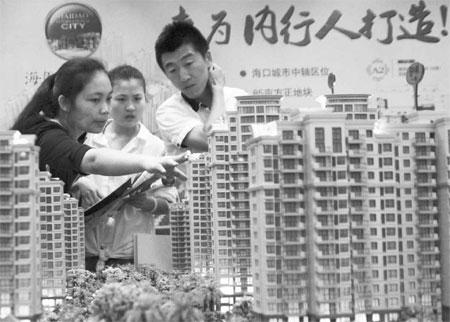Property developers face uphill battle
China's property developers face an uphill battle as home sales continue to decline and profits dwindle.
Among the 117 developers listed on the Shanghai and Shenzhen stock exchanges, 61 posted shrinking profits or even losses for the first three months, according to statistics compiled by Centaline Property Agency Ltd.
Total net profits of the 117 developers stood at 9.65 billion yuan ($1.55 billion) for the first quarter, down 27 percent from the same period last year, the data showed.
The results should not come as a surprise as China Vanke Co Ltd, the country's largest developer by revenue, had its first quarterly profit decline since 2002.
The Shenzhen-based China Vanke, widely seen as a bellwether for the residential market in China, registered a 5.2 percent drop in first-quarter profits with a 32 percent fall in revenue.
The disappointing performance came amid falling home sales nationwide. Official data showed sales of residential property dipped 7.7 percent during the first quarter to 1.1 trillion yuan, while sales by residential area contracted 5.7 percent to 178.25 million square meters.
Developers have also been languishing in the land auction market.
The top 20 developers by home sales bought less land in the first four months. The value of the land they bought decreased from 60.1 billion yuan in January to 32.56 billion yuan in February, then continued to drop to 25.45 billion yuan in March and to 13.3 billion yuan in April, according to Centaline.
Declining sales, falling profits and lower land purchases all point to a property market that has lost steam.
Zhu Zhongyi, vice-president of the China Real Estate Association, attributed the weak first-quarter figures to a high comparison base, combined with tougher lending conditions.
Home sales saw "explosive" growth in early 2013, as people scrambled to buy homes ahead of the implementation of a tightening measure on March 31 of last year, said Zhu.
Another factor is a credit crunch for developers and buyers that began late last year, Zhu added.
More supply of subsidized housing for low-income households has diverted a portion of demand and dented the market, said Hu Jinghui, vice president of the Beijing-based property consultancy Bacic & 5i5j.
More low-income housing and credit tightening have locked developers and potential buyers in a stalemate. Potential buyers are taking a "wait and see" attitude, and developers are wooing buyers with lower prices, said Zhang Dawei, chief analyst at Centaline.
Suppressed demand and more difficult credit access have sent smaller developers reeling. A small developer in Fenghua in east China's Zhejiang province went bust after it defaulted on a 3.5 billion yuan debt earlier this year.
Others that survived have resorted to price cutting. For example, in Hangzhou, developers made price cuts in the hope of getting apartments off their books faster. Some developers slashed prices by more than 30 percent, indicating pressure to clear their inventories.
Weak demand has forced governments and developers into action. Nanning, in the Guangxi Zhuang autonomous region, relaxed its policy on home purchasing in late April.
More second-tier cities are expected to loosen property curbs if demand remains subdued.
Housing prices in first-tier cities and most second-tier cities are unlikely to experience "big corrections," said Zhang. But this forecast is based on the assumption that the confidence of potential buyers in big cities will remain strong and that the "wait and see" mood will not spread to more potential buyers, Zhang added.
|
Visitors to a real estate exhibition in Haikou, Hainan province, inquire about a property project. Among the 117 developers listed on the Shanghai and Shenzhen stock exchanges, 61 posted shrinking profits or losses for the first quarter, according to statistics by Centaline Property Agency Ltd. Shi Yan / For China Daily |



















